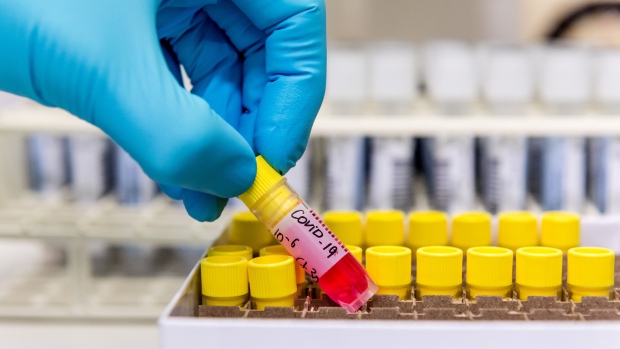Apr 21, 2020
U.K. to Start Human Trials of Coronavirus Vaccine on Thursday
, Bloomberg News

(Bloomberg) -- The U.K. will begin human trials of a coronavirus vaccine on Thursday, Health Secretary Matt Hancock said, as he argued that the government’s strategy for fighting the disease had succeeded.
“In the long run, the best way to defeat coronavirus is through a vaccine,” Hancock told the government’s daily news conference. “The U.K. is at the front of the global effort. We have put more money than any other country into a global search for a vaccine and, for all the efforts around the world, two of the leading vaccine developments are taking place here at home.”
Read more: Sunak’s ‘Whatever It Takes’ Virus Support Unprecedented in U.K.
The trials will be of a drug developed at Oxford University. Hancock said the government would give 20 million pounds ($25 million) to support the research. “In normal times, reaching this stage would take years,” he said. Another 20.5 million pounds will go to a separate project at London’s Imperial College.
Complaints from health workers about the availability of personal protective equipment continue, and a dispute about why the U.K. hadn’t taken part in a European Union procurement program was revived Tuesday. But Hancock was keen to emphasize the government’s achievements. He said that with the number of people hospitalized with the virus declining, the ministers had achieved their goal of protecting the National Health Service from being overwhelmed.
“At no point in this crisis has anyone who could benefit from critical care been denied that care because there weren’t enough staff, or beds, or ventilators to treat them,” Hancock said.
His announcement came as:
- A further 852 people were announced to have died in U.K. hospitals from the virus, a sharp increase from prior days, taking the total to 17,366
- Prime Minister Boris Johnson told President Donald Trump that he was “feeling better and on the road to recovery,” according to the White House
- The government’s scientific advisory committee met to discuss whether the public should wear face masks
- But deputy chief medical officer Jonathan Van-Tam told reporters the government didn’t want to do anything that might lead to shortages for medical staff
Earlier, Simon McDonald, the most senior official at the Foreign Office, appeared to contradict the official government line on why the U.K. hadn’t taken part in an EU program to buy medical equipment, saying it had been a “political decision.” At the time, Johnson’s office said an email inviting it to join hadn’t been received. Hancock rejected McDonald’s account, and said the U.K. had now joined the program, but that it had yet to lead to the delivery of any equipment.
‘Situation of Danger’
The health secretary said the process for finding a vaccine would take “trial and error,” but he has told U.K. scientists leading the search he would “back them to the hilt and give them every resource they need” in order to succeed. “After all, the upside of being the first country in the world to develop a successful vaccine is so huge that I am throwing everything at it,” he said.
Van-Tam said the number of new cases being diagnosed in the U.K. remained high. “It isn’t clear there is an enormous downturn at this point,” he said. “The numbers are varying day to day, but they remain high and we remain in a situation of danger that we must take very seriously indeed.”
He also set out the difficulty facing governments in deciding how to ease restrictions on public activities. “We do at some point hope that we turn this curve down,” he said. The difficulty then, he said, was “easing some of the restrictions we are under without letting this virus just chase off again. That’s a really difficult balancing act.”
The U.K. has been in a nationwide lockdown since March 23 and will continue to be so for at least another three weeks.
©2020 Bloomberg L.P.






